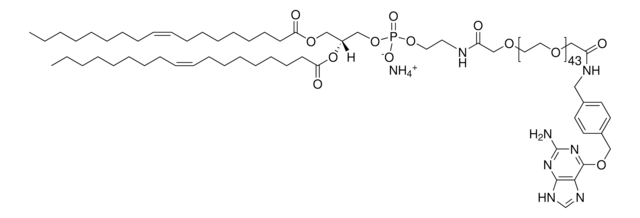890705C
Avanti
16:0-18:1 EPC (Cl Salt)
Avanti Research™ - A Croda Brand 890705C
Synonym(s):
1-palmitoyl-2-oleoyl-sn-glycero-3-ethylphosphocholine (chloride salt)
About This Item
Recommended Products
form
liquid
packaging
pkg of 1 × 1 mL (890705C-10mg)
pkg of 1 × 2.5 mL (890705C-25mg)
manufacturer/tradename
Avanti Research™ - A Croda Brand 890705C
concentration
10 mg/mL (890705C-10mg)
10 mg/mL (890705C-25mg)
lipid type
transfection
cationic lipids
shipped in
dry ice
storage temp.
−20°C
SMILES string
O=P(OCC[N+](C)(C)C)(OC[C@]([H])(OC(CCCCCCC/C=C\CCCCCCCC)=O)COC(CCCCCCCCCCCCCCC)=O)OCC.[Cl-]
General description
Application
- as a cationic lipid to explore the change in organization and dynamics of a membrane-bound fluorescent probe in host membranes of varying charge
- in the preparation of small unilamellar cationic liposomes
- in a novel albumin-associated lipoplex formulation to evaluate the antitumoral efficacy of immuno-gene therapy and “suicide” gene therapy
Biochem/physiol Actions
Packaging
Legal Information
Signal Word
Danger
Hazard Statements
Precautionary Statements
Hazard Classifications
Acute Tox. 3 Inhalation - Acute Tox. 4 Oral - Aquatic Chronic 3 - Carc. 2 - Eye Irrit. 2 - Repr. 2 - Skin Irrit. 2 - STOT RE 1 - STOT SE 3
Target Organs
Central nervous system, Liver,Kidney
WGK
WGK 3
Certificates of Analysis (COA)
Search for Certificates of Analysis (COA) by entering the products Lot/Batch Number. Lot and Batch Numbers can be found on a product’s label following the words ‘Lot’ or ‘Batch’.
Already Own This Product?
Find documentation for the products that you have recently purchased in the Document Library.
Our team of scientists has experience in all areas of research including Life Science, Material Science, Chemical Synthesis, Chromatography, Analytical and many others.
Contact Technical Service










